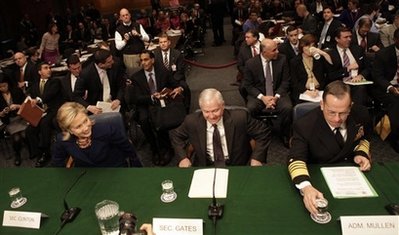Asia-Pacific
Gates: 'Severe consequences' for Afghan failure
(Agencies)
Updated: 2009-12-03 02:29
WASHINGTON: Failure in Afghanistan would mean a Taliban takeover of the country and "have severe consequences for the United States and the world," Defense Secretary Robert Gates said Wednesday as the Obama administration set out to sell its new war strategy on Capitol Hill.
|
 From left, Secretary of State Hillary Rodham Clinton, Defense Secretary Robert Gates, and Joint Chiefs Chairman Adm. Mike Mullen, prepare to testify on Capitol Hill in Washington, Wednesday, Dec. 2, 2009, before the Senate Armed Services Committee hearing on the US strategy in Afghanistan.[Agencies]
|
The insurgency already has gained "dominant influence" in 11 of Afghanistan's 34 provinces, said Chairman of the Joint Chiefs of Staff Adm. Mike Mullen, who appeared with Gates and Secretary of State Hillary Clinton before the committee.
Committee chairman Sen. Carl Levin expressed serious misgivings about the troop escalation when the Afghan security force remains small and weak.
"It seems to me that the large influx of US combat troops will put more US Marines on street corners in Afghan villages, with too few Afghan partners alongside them," he said in his opening remarks of the hearing.
The build up also will put more strain on troops by giving them less time than hoped for at home. Mullen said supplying the extra forces for Afghanistan while there are still so many in Iraq will mean putting off for a couple of years the goal of lengthening the time they rest and retrain at home in between tours of duty - a period the military calls "dwell time." The Army had been moving toward giving two years of dwell time between each one-year tour.
Despite the war's waning popularity among voters, there were few protesters on hand as Gates, Mullen and Clinton testified.
Vice President Joe Biden said earlier Wednesday the new surge-and-exit troop strategy is aimed more at wringing reforms from President Hamid Karzai than mollifying a war-weary American public.
Democrats criticized Obama's escalation of the 8-year-old war after his prime-time speech Tuesday night at West Point, N.Y. Republicans are unhappy with his promise to withdraw troops in 18 months, but Congress appears willing, nevertheless, to approve the buildup's $30 billion price tag.
Sen. John McCain, who lost to Obama in last year's presidential election, said he supports the build up but thinks it's wrong to signal in advance when a troop withdrawal might start. "We don't want to sound an uncertain trumpet to our friends in the region," the Arizona Republican said.
McCain asked Gates if the US would withdraw troops based on "an arbitrary date."
Gates replied "I think it's the judgment of all of us ... that we would be in a position particularly in uncontested areas where we would be able to begin that transition."
He said the July 2011 date was chosen because it was two years after the Marines went into Helmand province in a new push last summer. The secretary said he thought the United States would be in a position by December 2010 to determine whether it could begin a withdrawal by July 2011.
"I do not believe we have locked ourselves into leaving," said Clinton. "But what we have done ... is to signal very clearly to all audiences that the United States is not interested in occupying Afghanistan."











